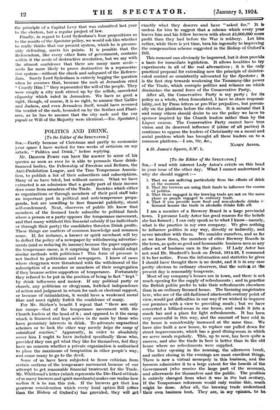[To the Editor of the SPECTATOR.]
SIR,—I read with interest Lady Astor's article on this head in your issue of the other day: What I cannot understand is why she should suggest :- 1. That we are suffering particularly from the effects of drink at the moment.
2. That the brewers, are using their fuRds to influence the course of politics.
3. That those engaged in the brewing trade are not on the same plane as people engaged in ordinary trade,
4. That if you provide more food and non-alcoholic drinks licensed houses the trade in. alcoholic drinks fats eff.
I am a member of a Brewery Board in a large provincial town. I presume Lady Astor has good reasons fnr the beliefs she has formed ; I can only speak as to what I know—.namely, what is the practice in my own company. We give nothing to influence politics in any way, directly or indirectly, and never interfere with them. We consider ourselves, and as far as we know them, the members of other Brewery Boards in the town, as quite as good and honourable business men as any other set of business men in the place. If Lady Astor has not read Dr. Shadwell's book on Drink, 1914-23, 1 commend it to her notice. From the information and statistics he gives I should have thought there is no doubt, and it is in any case pretty obvious to ordinary observers, that the nation at the present day is reasonably temperate.
Most of my company's houses are in town, and there is not much opening for the supply of refreshments ; and in practice the British public prefer to take their refreshments elsewhere than in an ordinary licensed house. The licensing magistrates here, who are of the old-fashioned nineteenth-century point of view, would put difficulties in our way if we wished to improve our premises with a view to providing meals ; but we have converted a billiard-room in one house, and made it into a snack bar and a place for light refreshments. It has been very successful in this way, and the amount of beer sold, in the house is considerably increased at the same time. We have also built a new house, to replace one pulled down fbr street improvements, which has a good dining-room in which we serve meals regularly. This, up to now, has been quite a success, and also the trade in beer is better than in the old house where no refreshments were supplied.
The later opening in the morning, the afternoon break, and earlier closing in the evenings are most excellent things. There is now a virtual monopoly in this business, and the brewers administer it to a large extent for the benefit of the Government (who receive the large part of the revenue), and afterwards for themselves and the public. The position is entirely changed from what it was in the last century. If the Temperance reformers would only realize this, much might be done. After all, the brewing trade understand. their own, business best. They are, in. my opinion. to be relied upon to do the right thing for the benefit of the com- munity just as well as any other set of Englishmen. Tell them that you rely on them—put them pretty much on honour—sweep away the licensing magistrates—restrict the brewers as little as may be by means of some Commissioners, pass not a single Act of Parliament on the subject for ten years and the results will be most gratifying. If, on the other hand, you abuse the Trade, wish to make people sober by Act of Parliament, and continue the licensing magistrates with their frequently intolerant narrow and anaesthetic minds, you will hinder the progress of good work already done.—I am, Sir, &c., A COMMON BREWER.















































 Previous page
Previous page